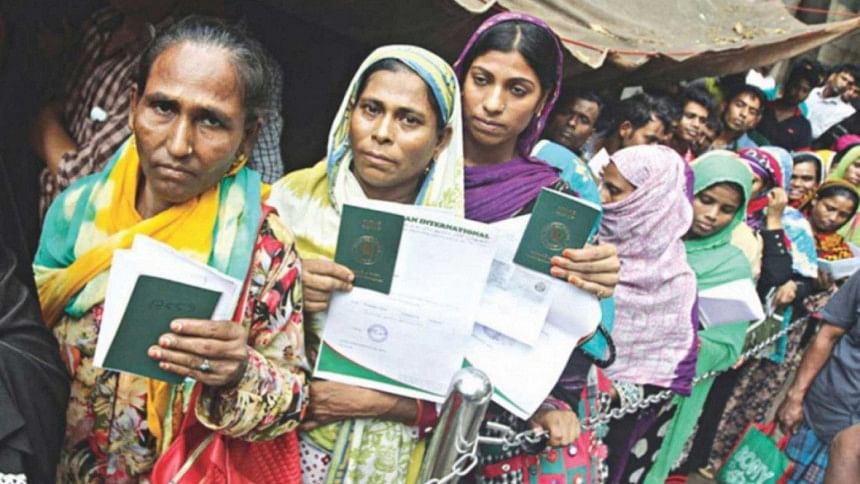88pc female migrants get no job contracts

Parul Begum (name changed), a single mother of two, thought she caught a break when she got the offer to work as domestic help in Qatar for a monthly salary of Tk 40,000.
In May 2017, she set off for Qatar -- without a job contract and just a verbal promise from her recruiter and employer.
But a rude awakening awaited the 42-year-old female migrant from Munshiganj in Qatar: her employer barely gave her any food and ordered her to work in another house as well.
This compelled her to quit in a month and return home at her own expense -- and without her wage for the month.
Parul is not alone; many impressionable migrant workers like her in Bangladesh went through a similar nightmare, finds a report titled "Access to Justice for Bangladeshi Migrant Workers: Opportunities and Challenges" by Ovibashi Karmi Unnayan Program (Okup).
Between 1991 and May this year, about 10.5 lakh female workers migrated to different countries, according to the Bureau of Manpower, Employment and Training.
The community-based migrant workers' organisation conducted a field-level survey last year on 262 female migrants for the report.
The majority of the survey respondents migrated between 2015 and 2019 and returned home between 2018 and 2019.
About 88 percent of the female migrant workers were not provided with a written job contract. They were briefed on the employer, job responsibilities, wages and benefits through informal discussions.
Nearly 45 percent of the returnee women said they had not received the same amount of wage and benefits that they were promised by the agents or sub-agents, the report said.
Just a handful of the women interviewed knew what a job contract was.
Among those who had a written job contract before migration, about 47 percent received the document a few hours before their flights.
Without a written job contract, migrant workers lose their bargaining capacity and self-protection, said Rahnuma Salam Khan, a government official who worked as the national programme officer at ILO Bangladesh's migration office.
"It's like a lifeline," she said, adding that if the contract is in the possession of someone else the migrant worker may face 'forced labour'.
Also, if a legal issue emerges, it will be difficult for the migrant to make a move without the document, she said, while urging migrant workers to gather ample knowledge about issues regarding their migration.
Recruitment agencies and their representatives such as sub-agents or intermediaries are supposed to ensure that migrant workers have a written job contract, said Shakirul Islam, chairperson of Okup and also the lead researcher of the study.
"But they do not. Migrants mostly remain in the dark about the job contract," he added.
The government's 2007 policy for "sending female domestic workers to Saudi Arabia and other Middle East countries" says the agency has to provide workers with a copy of the "recruitment contract", including Bangla translation, before migration.
An employment contract between the recruited worker and the employer will stipulate the worker's wage, accommodation facilities, duration of employment, compensation amount in the event of death or injury, cost of emigration to and return from the foreign country, and so on, says the Overseas Employment and Migrant Act-2013.
The recruitment agent shall be deemed to be a representative of the overseas employer, it says.
The agencies do follow the government's 2007 policy, said Shameem Ahmed Chowdhury Noman, former secretary general of Bangladesh Association of International Recruiting Agencies.
"There is no reason that the migrant workers are not getting the hard copy of their contracts since it is part of the recruitment system. A worker cannot migrate without a job contract."
However, if a recruitment agency does not provide a written job contract, the migrant worker has to demand one, he added.

 For all latest news, follow The Daily Star's Google News channel.
For all latest news, follow The Daily Star's Google News channel. 



Comments